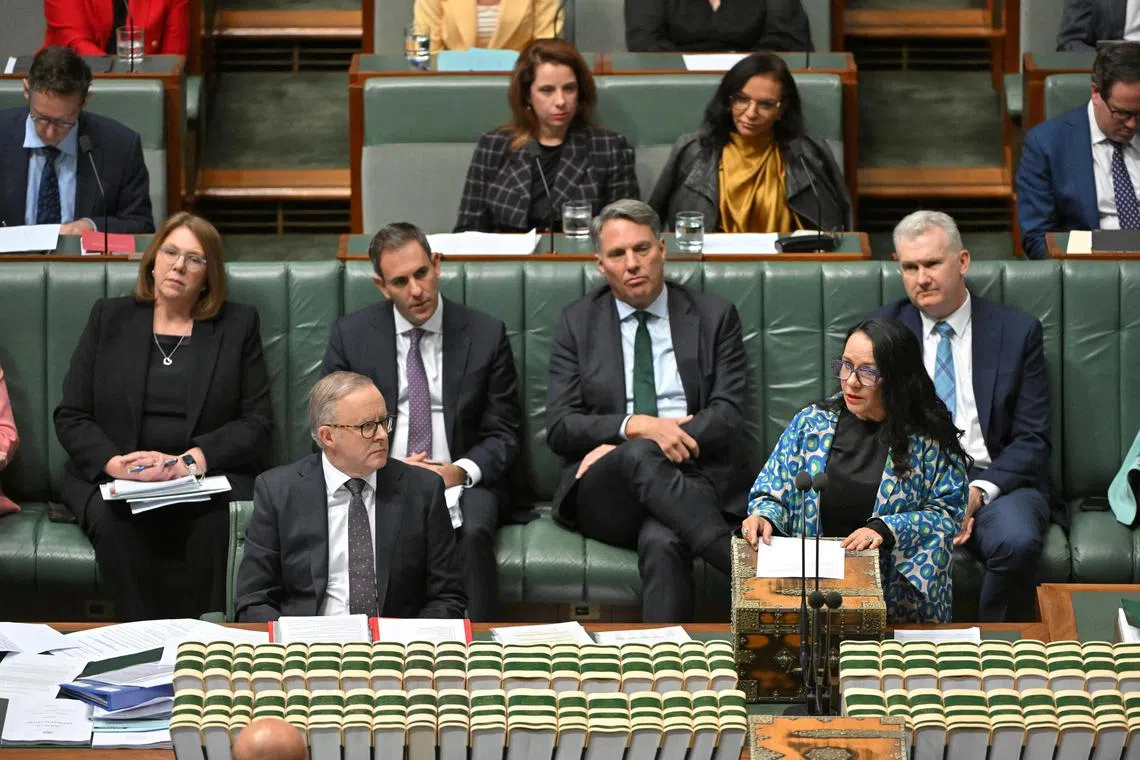Australia considers curbs on election donations to keep ‘big money’ out of politics
Sign up now: Get ST's newsletters delivered to your inbox

The Australian government will also consider introducing a cap on how much candidates can spend at elections.
PHOTO: REUTERS
Follow topic:
SYDNEY – Australia’s ruling Labor Party has launched a push to finally curb political donations and limit the influence that “big money” has on policymakers in Canberra.
The government has signalled that it will consider a range of measures, including introducing caps on the amount that donors can provide – a measure designed, it said, to prevent elections becoming “an arms race, where whoever has the deepest pockets wins”.
It will also consider introducing a cap on how much candidates can spend at elections and a requirement that donations be disclosed in real time.
Currently, parties must disclose donations annually, meaning that the public often does not learn about donors and funding until long after the election.
The measures, outlined in a report by a parliamentary committee that examines electoral laws, follow mounting public concerns about the growing reliance of politicians on donations.
The centre-right Liberal-National Coalition has for years accused Labor of being overly dependent on donations from unions. Labor, in turn, has accused the Coalition of depending on backing from corporate interests.
There have also been concerns about the ability of wealthy individuals to exert influence in Canberra or buy their way into Parliament.
Notably, mining tycoon Clive Palmer,
Mr Palmer was elected as a Lower House MP in 2013 and spent three years in Parliament. In the last election, he donated A$117 million to his party, securing the election of just one MP in the 76-member Upper House.
But political parties and candidates of all stripes have become increasingly dependent on donations.
Analysis released in June by the Centre for Public Integrity, an anti-corruption think-tank, found that election spending in the federal election in 2022 reached a record A$440 million.
In addition, parties are becoming increasingly reliant on a small circle of donors. In the year to June 30, 2022, the top five individual donors contributed 70 per cent of donations, compared with less than 20 per cent in 2006.
The think-tank said that reform is crucial to ensure that “elections are a contest of ideas rather than dollars”.
“These figures threaten our constitutional guarantee of political quality and present a potential corruption risk for Australia’s governing parties,” the centre said in its analysis. “For too long, big money has been allowed to buy big influence in Australian politics.”
The parliamentary committee report said introducing annual donation caps will limit the influence of individual donors, who can currently give unlimited amounts to parties and candidates.
It also recommended reducing the amount at which donations must be disclosed from A$15,200 to A$1,000 and proposed placing caps on the amount that candidates can spend.
The chair of the committee, Ms Kate Thwaites, a Labor MP, said the changes will bolster transparency and confidence in electoral processes at a time when democracy is under growing threat around the world.
“Across the Western world, we see the potential for a drift from democracy when people feel like their political system isn’t working for them and believe that their system has been captured by vested interests,” she said in a foreword to the report. “It’s a trend that we must work hard to avoid in Australia.”
But the Coalition has expressed concern about some of the proposed changes, saying in a dissenting report that spending caps will “rig” the system in favour of Labor, which receives some support from unions that will not necessarily count as donations.
The Coalition said any spending caps should not apply only to political parties but also to other organisations that fund electoral campaigns. This proposal is designed to combat the growing number of progressive independent MPs, known as the “teals”, who have been targeting seats held by the Coalition.
But these independents take a different stance, saying that any caps should not prevent non-party candidates – who lack the support base and funding of major parties – from raising funds and competing against entrenched parties.
In the 2022 election, teal candidates received support from Climate 200, a non-governmental organisation that supports action on climate change, promoting gender equity, and improving integrity in politics. The organisation used crowdfunding to raise A$13 million, which helped 11 independent candidates win seats.
The government has signalled that it will bring legislation to introduce reforms but wants to consult the Coalition, Greens and independent MPs to try to ensure the changes have bipartisan support.


